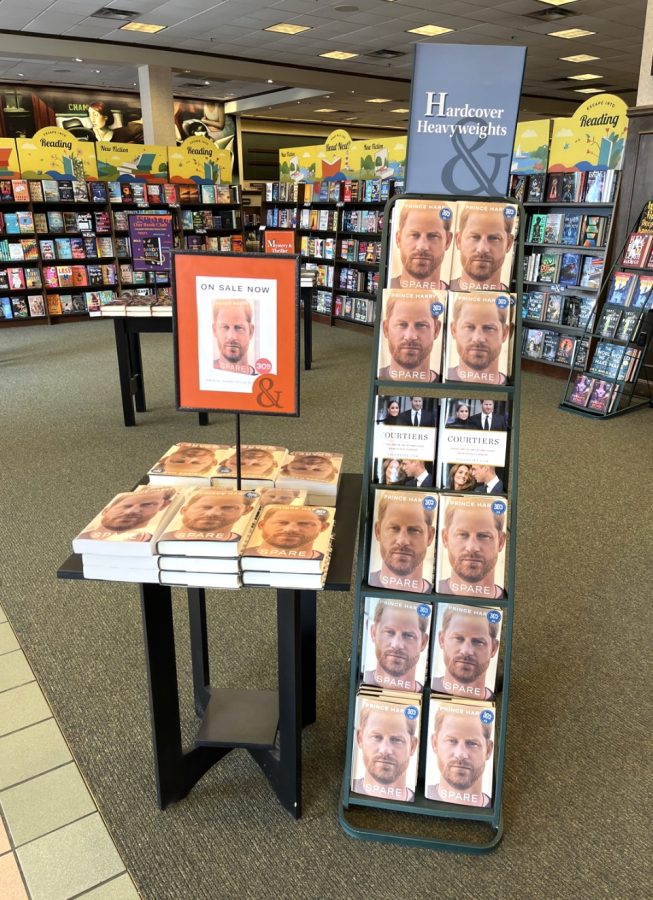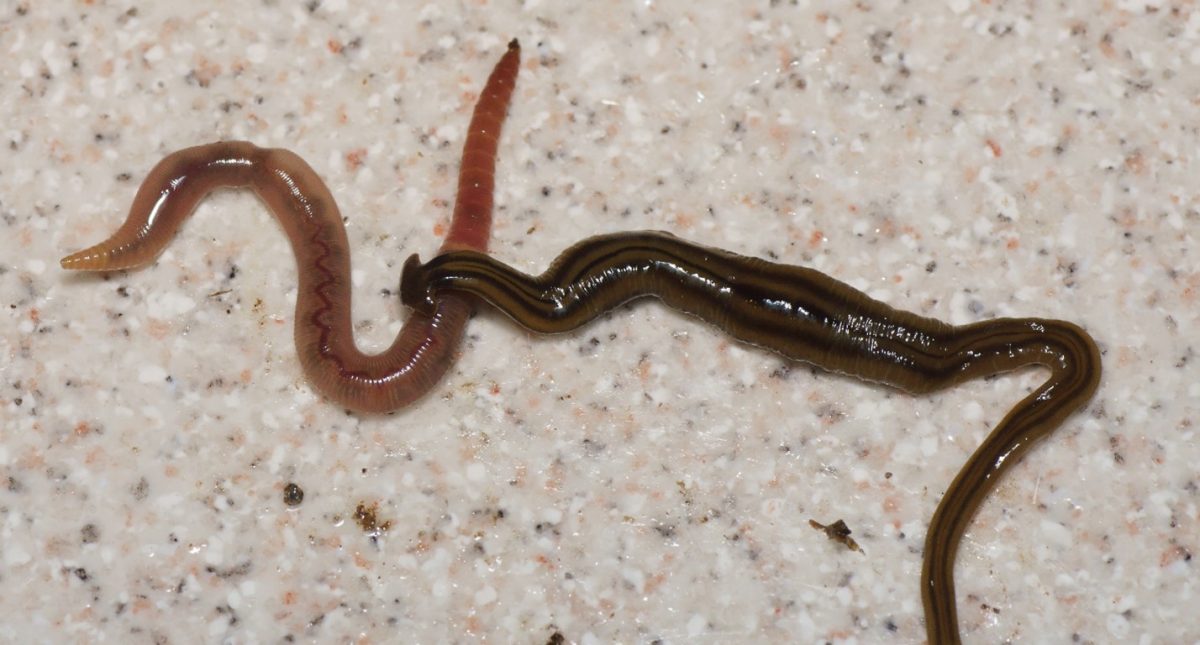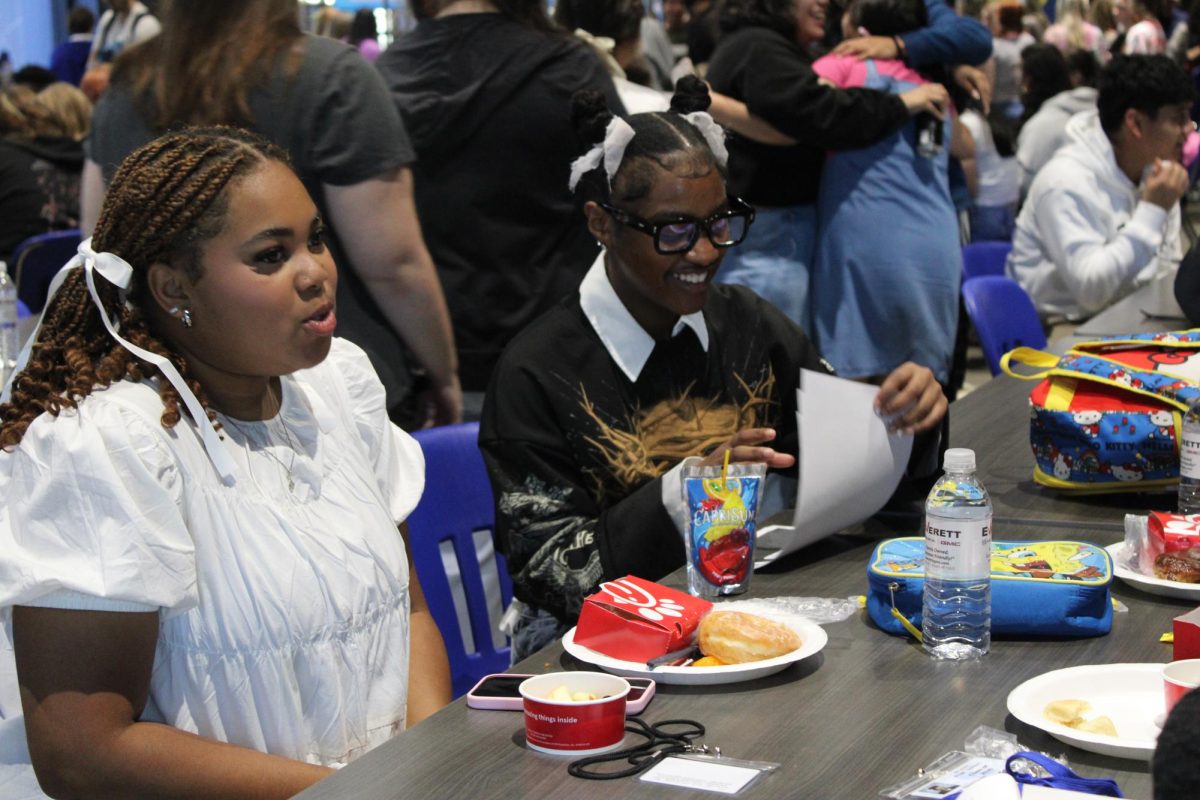Never Complain, Never Explain
A Review On Prince Harry’s Memoir “Spare”
Molly Kitchens photographs a display of Prince Harry’s memoir, Spare, at Barnes & Noble
February 9, 2023
Disclaimer
Although this is indeed a book review of Prince Harry’s latest memoir, I would like to address something I hope will not get misunderstood: I’ve always had a very neutral opinion regarding the British royal family and what was reported in news outlets about their decisions and lifestyles. I am neither a royalist nor an individual who opposes any kind of monarchy.
Indeed I can write all day about how they are royalty and have many opportunities most ordinary civilians don’t have. However, I would love for readers to understand that I also see them as human beings—capable of making mistakes, worrying about relationships, and other things ordinary individuals might worry about, while having more privileges, of course.
I don’t mean for this review to be a bash against the British royal family or anyone who opposes the royal family. I am merely giving my honest, unbiased review. For reference, I’m also from the U.S. and don’t entirely understand the complexity and meaning behind the royal family.
The Release And The Leak
On Jan. 23, Prince Harry, Duke of Sussex, and his ghostwriter J.R. Moehringer released an official memoir of Prince Harry’s life through youth and adulthood titled “Spare,” after Prince Harry’s role as the “Spare-heir” to his older brother William, Prince of Wales.
Upon hearing this news, many curious readers dashed to their local bookstore to pick up a copy of Prince Harry’s life story, especially with his viewpoints and experiences with the infamous paparazzi and gossiping journalists.
Prior to its release, “Spare” already had quite a few leaks and hints regarding its plot and details. According to the BBC, a surprise sale of the book was held by some Spanish booksellers and it appears that the “unanticipated publicity” will not hurt the sales of the actual book. Philip Jones, the editor of a trade paper known as The Bookseller, told BBC News that he believes the leaks were “70% good” for its publication and publisher, Penguin Random House.
Flying off the shelves—with more than 3.2 million copies sold worldwide, according to the Los Angeles Times—Prince Harry’s memoir has been subject to intense speculation and critique.
“Spare” has mostly received mixed reviews. Some were positive and sympathetic to Prince Harry’s detailed lifestyle of dealing with the press—what he and his brother nicknamed the “wall”—ever since he was a pre-teen (about the time of his mother’s unexpected death). Others were more cynical and honest to Prince Harry’s revelations of his younger years of drug-usage and his reactions towards the arguments of his family.
But the question remains: is it worth reading?
The Review
Trigger Warning: The following section contains explicit descriptions of violence. Please read with caution.
Following the death of his mother, Diana, Princess of Wales, it is no secret that many media and news outlets have focused their gaze on her two sons: Prince Harry and Prince William—the following is even acknowledged in Prince Harry’s official memoir site.
While reading, I found it very saddening how Prince Harry copes with his mother’s death, as well as his beliefs on the press, to the extent it was practically depressing to read. Prince Harry, from just the age of twelve, didn’t truly accept the reality of his mother’s sudden death and proceeded to believe his mother had faked a disappearance for years (from multiple accounts of Diana claiming she wished she could go into hiding).
Not only with the aftermath of his mother’s tragic death, the denial Prince Harry faces— and even Prince William faces in the beginning of the memoir—is beyond heartbreaking. Though I understand that Prince Harry is not the only individual to comprehend grief in such a matter, his detail makes it feel all too real.
His descriptions of the press and media outlets are that of great distaste, to the extent you might wonder if it is even fear. Yet, with how much Prince Harry goes into detail regarding what news stories have been published about him, including an unethical news publication discussing his drug-usage when he was just a teenager, you can’t help but feel pity for him, as well as other royals, like the exploitation of Princess Diana’s death or King Charles III’s marriage to Camilla, Queen Consort of the United Kingdom.
Overall, I found the memoir to be interestingly descriptive at best and exhaustingly impatient at worst. Prince Harry’s recollection of detail and emotional responses is astonishingly remarkable. I found this was one of the primary reasons why I felt engaged while I was reading, as it made the story feel more legitimate and less like another biography written about a member of the Royal Family with lengthy sentences on their renowned family tree, etc..
This descriptive narration is all fine until you stumble upon a chapter when Prince Harry goes into great detail on how he once got frostbite on his buttocks (yes, I wish I was joking, too) which occurred at the wedding of Prince William and Catherine, Princess of Wales. Or when Prince Harry’s head gets shoved into the body of a fresh deer carcass by his guide at Balmoral during a blooding ritual, which is a ritual that consists of the shedding of blood of an animal or other being—a blood sacrifice, essentially. This scene especially made me uncomfortable as Prince Harry felt as though he was about to die. “Well, I thought, so this is death.” Harry writes.
His interesting descriptions can also make reading scenes like his brother and him allegedly fighting all the more tragic and even unsettling. “My God. Sibling rivalry,” Prince Harry wrote. “Had we not got past this yet? The whole heir versus spare thing? He grabbed me by the collar, ripping my necklace and he knocked me to the floor.”
Prince Harry claims that his brother had asked him to hit him back. “He wanted me to hit him back, but I chose not to.”
Prince Harry’s overall relationship with his brother is that of an ordinary brother-to-brother relationship to a rather tragic relationship. For example, in the beginning, Prince Harry and Prince William appear to be just fine with each other until they start school after their mother’s death. Prince Harry claims that Prince William—who was fifteen at the time—distanced himself from Prince Harry. Prince Harry claims that his brother mainly wanted to spend time with his friends rather than with Harry (I personally didn’t find this all too shocking, considering how most teenagers stray away from younger siblings at that age even if there’s no particular reason for it).
After Prince Harry’s marriage to Meghan, Duchess of Sussex, media outlets soon focused on Prince William and why he was allegedly not too fond of the marriage between his brother and Meghan. According to an ITV interview with Tom Bradby, Prince Harry claims, “I don’t think they were ever expecting me to get—or to become—to get into a relationship with someone like Meghan who had a very successful career. There was a lot of stereotyping that was happening, that I was guilty of as well, at the beginning. So, you know, the fact that I had that in the back of my mind, and some of the things that my brother and sister-in-law—some of the way that they were acting or behaving definitely felt to me as though unfortunately that stereotyping was causing a bit of a barrier to them […], introducing or welcoming her in.”
One of the things I found surprising when I was reading was how the story felt as if it was dragging here and there. Perhaps this is just me, but as I was reading, I felt as if you were waiting for large events to be addressed and explained. However, I found the writing style and descriptive narrative really makes the story feel like a nice carriage ride through minor and major events rather than a freight train journey through all the topics the press publicized or took advantage of regarding the royal family.
I will admit that before reading, the news of Prince Harry releasing a memoir made me a bit astonished. I had heard multiple news outlets discussing the relations and “drama” behind the British royal family and Prince Harry ever since I could remember. Prince Harry’s memoir also impressed me because I recall the British public relation strategy of “never complain, never explain,” and what a testimony it must mean to “Spare” as its story doesn’t shy away from family tension and arguments that would perhaps be hot water for the press to report on.
Despite the shocks that can come with reading “Spare,” Prince Harry’s intention with creating “Spare” was to simply tell his story without the literary manipulation of the press or other media outlets.
“38 years of having my story told by so many different people with intentional spin and distortion felt like a good time to own my story and be able to tell it for myself.” Prince Harry states in the same ITV interview. “You know, I don’t think that if I was still part of the Institution that I would have been given this chance to. So, I’m actually really grateful that I’ve had the opportunity to tell my story because it’s my story to tell.”







